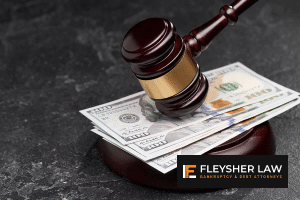This page was written, edited, reviewed & approved by Emil J. Fleysher following our comprehensive editorial guidelines. Emil J. Fleysher, the Founding Partner, has 15+ years of legal experience as a bankruptcy attorney. Our last modified date shows when this page was last reviewed.

Deciding whether to file for bankruptcy or seek debt relief significantly impacts your financial future. Understanding each option's implications on your debts, assets, and credit score is crucial. Bankruptcy can provide a new opportunity for those struggling with debt, but it comes with its own set of challenges and consequences. Debt relief offers an alternative path, potentially reducing the amount owed or consolidating debts into a more manageable form.
At Fleysher Law, we can help you decide if a debt consolidation loan, a debt settlement plan, or a bankruptcy filing is right for you. We know you want to consolidate debt, but you might also be worried about your credit scores. Learn more about bankruptcy debt settlement and debt relief below. Then, contact us to schedule a consultation.
Before making any decisions, take a close look at your financial situation. Identify all your debts, assets, income, and monthly expenses. This includes a potential home equity loan, student loan debt, and child support payments. This comprehensive view is essential for understanding the scope of your financial challenges and opportunities.
Consider your debts and financial goals. Are you facing high-interest credit card debt, personal loans, or mortgage payments you can't keep up with? Your decision may vary depending on whether your debts are secured or unsecured. Also, think about your long-term financial objectives. Do you aim to be debt-free, improve your credit score, or simply get your monthly payments to a manageable level?

Both bankruptcy and debt relief can help manage overwhelming debts, but they approach the problem differently. Bankruptcy may eliminate certain debts, while debt relief strategies work to reduce or reorganize what you owe.
Bankruptcy involves a legal process that can discharge or reorganize your debts. Chapter 7 bankruptcy, known as liquidation bankruptcy, can wipe out many unsecured debts but may require you to sell some assets. Chapter 13 bankruptcy gives you the opportunity to keep your assets and repay debts over time based on a court-approved repayment plan.
Debt relief can include debt consolidation, debt settlement, or a debt management plan. Debt consolidation loans merge multiple debts into a single loan with a lower interest rate. Debt settlement companies negotiate with creditors to allow you to pay a lump sum that's less than the total you owe. A debt management plan, set up by a credit counseling agency or debt settlement company, consolidates your debt payments into one monthly payment without needing a new loan. Working with a nonprofit credit counselor could be a smart move.
Pros:
Cons:

Filing for bankruptcy or choosing debt relief will affect your finances today and tomorrow. Initially, both can provide relief from the immediate pressure of debt payments. However, they may also limit your ability to use credit and impact your financial reputation.
Successfully completing a bankruptcy or debt relief program can improve your financial situation over time. You'll likely find it easier to budget without the burden of overwhelming debt. Yet, the impact on your credit score and history can last for years. This impacts your ability to borrow money or qualify for favorable interest rates.
While your credit score can bounce back up to around the 700 mark within a year of filing for bankruptcy, the bankruptcy filing can show on your credit report for up to 10 years as a public record, while completed debt relief programs typically remain for seven years. This can make it more challenging to obtain new credit, buy a home, or even find employment in some cases. However, it's possible to start rebuilding your credit score over time. This happens as you make timely payments and manage new credit responsibly.
Restoring your credit after bankruptcy or debt relief requires patience and discipline. You may begin with a secured credit card or small personal loan to demonstrate your creditworthiness. Over time, as you continue to make on-time payments, your credit score will gradually improve.

Pros:
Cons:
Debt settlement involves negotiating with creditors to pay off a debt for less than the amount owed. Opting for this choice carries risk, potentially leading to a brief reduction in your credit score., and there's no guarantee creditors will agree to negotiate. Furthermore, saved amounts might be taxable.
Debt consolidation merges several debts into a single debt with a lower interest rate. This method simplifies your payments and can save you money on interest in the long run. It's a less risky option than settlement but requires a good credit score for the best terms.
To be eligible for bankruptcy, you have to fulfill certain conditions, such as income limits for Chapter 7 or disposable income requirements for Chapter 13. Debt relief eligibility varies by program but generally requires a certain amount of debt and financial hardship.
Not all filers will qualify for debt relief programs. Factors like the types of debt you owe, your salary, and your ability to make regular payments play a role. Reputable debt relief services will evaluate your situation to determine if their program is a good fit.
Decision-making between bankruptcy and debt relief involves assessing your financial situation, goals, and specifics. You should also consider the long-term implications of each option on your finances and credit.
Getting professional advice is key when considering bankruptcy or debt relief. A bankruptcy lawyer can help you through the legal complexities of filing, while a credit counselor can offer insights into debt relief programs.
Legal advice ensures you understand the implications of each option. Your attorney can provide you assistance in making an informed decision. It can also protect you from making costly mistakes or falling victim to scams.
After completing a bankruptcy or debt relief program, focusing on rebuilding your financial health is crucial. This includes creating a budget, saving for emergencies, and responsibly using credit.
Rebuilding your credit takes time but is possible with consistent effort. Start with small, manageable lines of credit and pay your bills on time. Financial stability also means living within your means and saving for the future to avoid falling back into debt.

If you're considering bankruptcy or debt relief, Fleysher Law can provide the guidance and support you need. Our experienced team can help you navigate the complexities of each option and find the best path forward for your financial situation.
Choosing between bankruptcy and debt relief is significant, but you don't have to do it alone. Fleysher Law offers personalized advice and representation to help you achieve financial freedom. Contact us today to discuss your options.

Emil specializes in consumer bankruptcy, debt settlement, and mortgage modification, offering a holistic approach to solving mortgage and debt problems. Emil listens to clients, understands their circumstances and goals, and helps them make the right choices by presenting all options and contingencies.
He is dedicated to helping South Floridians regain their financial freedom from overwhelming debt caused by high interest credit cards, bad mortgage loans, and uninsured medical expenses.

"*" indicates required fields